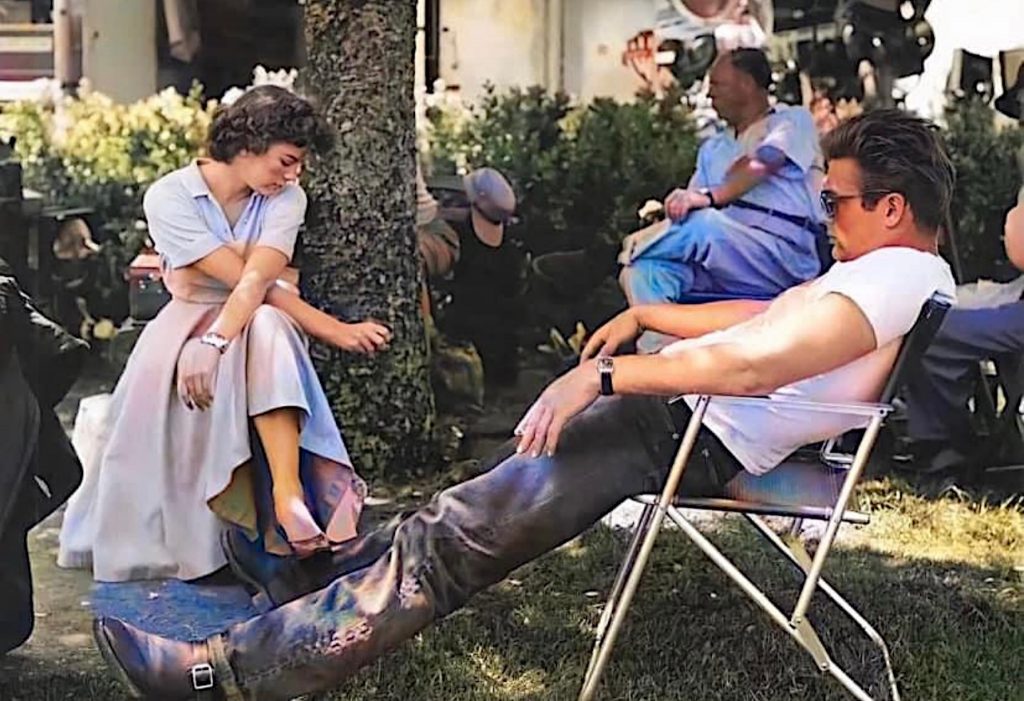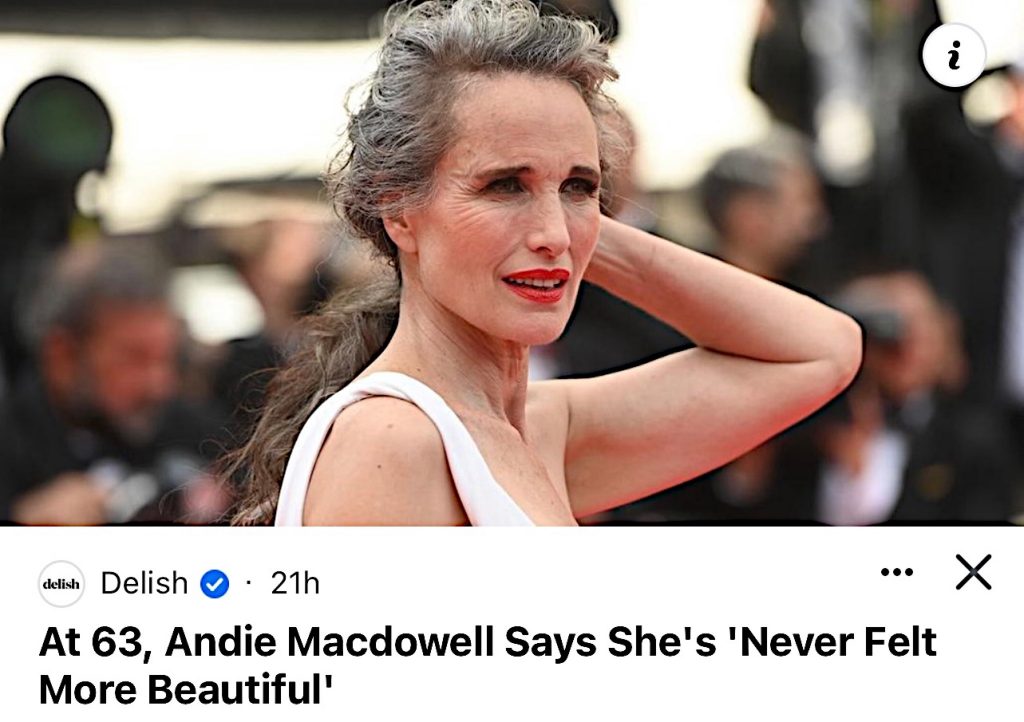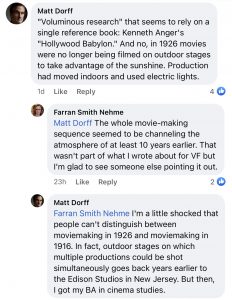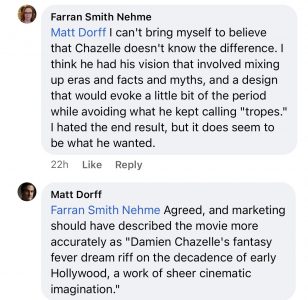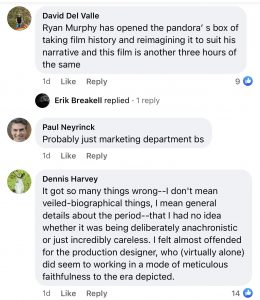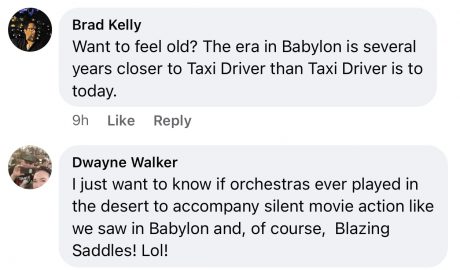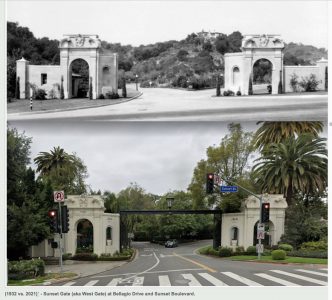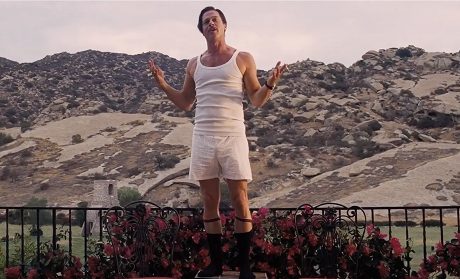The Oscars have been withering on the vine for the last six or seven years due to woke politics and are pretty much all but toast, but in the view of the Los Angeles Times editorial board and an editorial they posted on 12.27, they’re not toasty enough.
“Let’s really stick a fork in this sad, dying annual celebration of movies,” a 12.27 LAT editorial essentially says. “Let’s urge AMPAS and the TV academy to kill gender-based acting Oscars in order to satisfy the political goals of the trans community and their progressive allies.”
Everyone understands that the lore of the Academy Awards telecast is all but finished. The viewing audience been shrinking over the last several years, especially among Millennial and Zoomers and double especially since the disastrous, pandemic-sieged Soderbergh Oscars of April 2021.
My heart is broken over this. I used to feel joyful during Oscar shows; now there’s almost nothing. James Stewart, Grace Kelly, Billy Wilder, Cary Grant, Ernest Borgnine, Bette Davis, Katharine Hepburn, William Wyler and William Holden are weeping in heaven and taking turns pounding the refrigerator door.
But in order to finalize the death process, the show needs one more kitchen knife shoved between the ribs, and the gender neutral acting initiative might just be the dagger point that does the job.
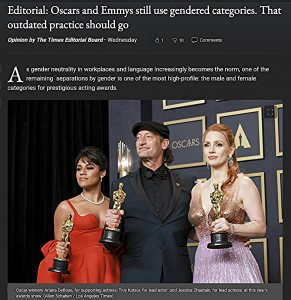
On 8.23.22 the Spirit Award honchos decided to abandon gender categories for acting awards, more or less following the lead of the Gotham Award guys. Two months later (on 10.12.22) a woke cabal within the Los Angeles Film Critics Association adopted the same policy, despite nearly half of LAFCA being opposed to gender neutral.
And now this L.A. Times editorial has gotten into the act.
I said this last August and I’ll say it again: “If the Academy decides to go gender-neutral with the Oscar acting awards, the eclipse will be total and absolute, and I mean beyond the level of anything dreamt of by Michelangelo Antonioni.
“In a populist cultural sense as well as aesthetically, the Oscars will have announced to the Joe and Jane Popcorn public that after six or seven years of fiddling around with secular woke passions and priorities, the Oscars are truly no longer about engaging even a semblance of a mass audience, or certainly in any way that seems to matter.
“Yes, Virginia, the Oscars are about wokesterism, secular industry politics and (this is key) elbowing older, insufficiently progressive white guys aside…about a tiny cabal of progressive fanatics who are determined to de-popularize not just the Oscars but movies themselves.
If AMPAS manages to eliminate gender-based acting awards, Average Joes and Janes will simply walk away and stay away…the more impassioned among them (i.e., the Oscar torch-bearers and sentimentalists) will raise their fists and voices and say “stop this insanity, stop this bullshit…outside the woke realm men are men and women are women, and they generate different moods and expressions and ways of living and processing the ups and downs of living…stop this bullshit and come down to earth.”
All hail the death of the great American art form called movies…right? All hail the political instruction that has overtaken a significant portion of mainstream movies and the casting process altogether. The Oscars were launched in the late ’20s and are now, 95 years later, on the verge of completely erasing themselves from mass public consciousness. All hail presentism!
And why? Several reasons and factors are behind this, but in today’s context it boils down to this: the non-binary trans community wants to strengthen its political influence and power. And to accomplish this goal, one of the most populist, mass-outreach, Joe and Jane Popcorn aspects of the Oscar telecast — gender-based acting categories, which have been with us for nearly a century and in fact for hundreds of years beforehand — has to be dissolved.
What the overwhelming majority of movie lovers might prefer is not important. The aims of a small activist minority is what counts.
Read more






